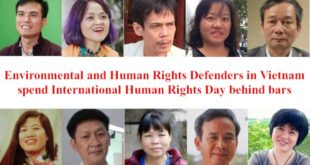GENEVA, 30 March 2007 (Vietnam Committee on Human Rights) – In a move praised by Western diplomats as a step towards the rule of law, Vietnam this week announced the abolition of Decree 31/CP on “Administrative Probation”, a measure routinely invoked to detain dissidents and government critics without trial. However, in a Written Statement to the UN Human Rights Council in Geneva, the Vietnam Committee on Human Rights stated that the communist authorities had remained silent on the existence of a lesser known but more repressive law, Ordinance 44 on “Regulating Administrative Violations”, which gives local officials wider powers to not only to arrest and detain citizens suspected of “national security” offences, as Decree 31/CP, but also to commit them to mental hospitals or “rehabilitation camps” without any due process of law.
Mr. Vo Van Ai, Chairman of the Vietnam Committee on Human Rights and Quê Me : Action for Democracy in Vietnam, told the UN that Ordinance 44 (Ref. 44/2002/PL-BUTVQH10), adopted by the National Assembly’s Standing Committee in July 2002 and effective as of 1st October 2002, is far more prohibitive than Decree 31/CP. Ordinance 44 empowers provincial and district-level People’s Committees to detain without trial citizens “who have violated laws on security, public order and social safety, but whose offence is not serious enough to justify prosecution”. Whereas Decree 31/CP allowed for administrative detention only, Ordinance 44 authorizes three possible forms of detention for periods of 6 months to 2 years : detention in “educational institutions” (Article 25) ; internment in “medical facilities” (Article 26), or administrative detention (Article 27). The first two may be authorized by district People’s Committees, the latter requires the approval of the Provincial People’s Committee Chairman. “Educational institutions” are usually rehabilitation camps or Social Protection Centres where “bad social elements” such as prostitutes, drug addicts, street children or dissidents may be held without charge, often in inhumane conditions. The Ministry of Public Security and the Ministry of Labour, War Invalids and Social Welfare work together to set up new centres where necessary. “Medical facilities” include mental hospitals and psychiatric institutions. In November 2006, lawyer Bui Thi Kim Thanh was committed to Bien Hoa Mental Hospital in Saigon for defending expropriated farmers and protesting state confiscation of land. She was subsequently released, but is deeply traumatized by this experience.
“The abrogation of Decree 31/CP is just one more ruse to delude international opinion”, said Vo Van Ai. “Vietnam is a master in the art of deception. Before the government abrogated Decree 31, it adopted new, more repressive legislation to suppress dissent. With Ordinance 44, Vietnam is going back to the Soviet era with its psychiatric hospitals and re-education camps”.
The UN Human Rights Committee strongly denounced Decree 31/CP in July 2002 when they examined Vietnam’s periodic report on its implementation of the International Covenant on Civil and Political Rights, and called for its immediate repeal. At that very moment, Vietnam was adopting the new Ordinance 44 to continue legalization of this arbitrary practice.
This post is also available in: French
 Quê Me Quê Me: Action for democracy in Vietnam & Vietnam Committee on Human Rights
Quê Me Quê Me: Action for democracy in Vietnam & Vietnam Committee on Human Rights




